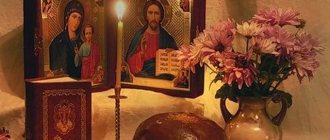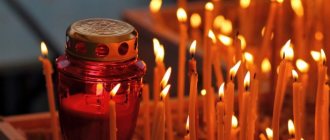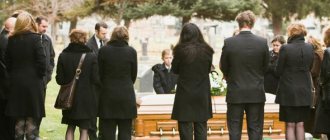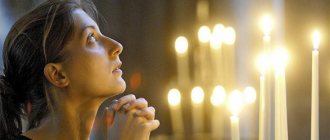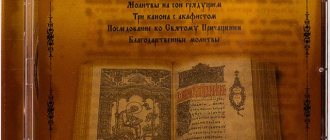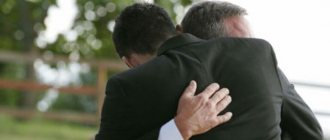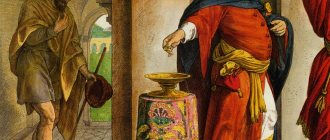Prayer is the only way a person communicates with God. Throughout the history of Orthodoxy in Russia, the word of prayer has accumulated over the centuries and serves as a means of maintaining faith. In church, the power of prayer increases several times, running upward. Therefore, it is important to periodically visit the temple of God to pray with other believers for salvation. An experienced Christian knows that before going to church, he needs to tune in and read the prayers of those who go to church along the way.
Prayer is a very important part of meeting with God; it helps to open the soul and heart. In order to come with a good disposition, open to dialogue with the Lord, the prayer of those going to the temple will help not to succumb to dark forces.
We rejoice in those who ride me, we enter the house of the Lord. And according to the abundance of Your mercy, O Lord, I will enter Your house, I will worship Your holy temple in Your passion. O Lord, insist on my righteousness, my enemy, to correct my path before You; Without stumbling, I will glorify the One Divinity, the Father and the Son and the Holy Spirit, now and forever and ever. Amen.
How to behave in church
After leaving the temple, you must read the prayer again. In addition, you need to cross yourself three times and bow. When leaving the church gates, you should also cross yourself, while facing the church. In this way, a person thanks God for the opportunity to communicate with him.
READ ALSO: Predictions for 2022 for Russia from psychic Julia Wang, what should we expect?
Visit to the temple
For an active Orthodox Christian, visiting church is the norm. Whenever possible, you can attend church at least every day, but this rarely works out.
In order to stand before the Lord with a pure soul, you need to read a prayer before going to church
Therefore, there is some rule that establishes the frequency of visiting the temple:
- attend the Divine Liturgy every Sunday, as soon as you are ready to receive communion;
- on Saturday and on great holidays, of which there are only 12 a year, attend an all-night vigil in the evening.
Psalter
HOW AN ORTHODOX PERSON BEHAVIOR IN THE TEMPLE OF GOD:
On the way to church there is a custom to read a prayer:
I will go into Your house, I will bow to Your holy temple in Your passion. Lord, guide me with Your righteousness, for the sake of my enemy, straighten my path before You: for there is no truth in their mouths, their heart is vain, their throat is open, their tongues are flattering. Judge for them, O God, that they may fall away from their thoughts; for the multitude of their wickedness, I will rid them of them, for I have grieved Thee, O Lord. And let all who trust in Thee rejoice, rejoice forever, and dwell in them, and let those who love Thy Name boast in Thee. For you have blessed the righteous, O Lord, for you have crowned us with weapons of favor. (Psalm 5:7-12)
In addition to this prayer, you can read the troparion, kontakion and other hymns of the service of this day, the 50th and 90th psalms, and remember the sacred events that the Church celebrates on a given day.
One must enter the church quietly and reverently, as into the house of God, into the mysterious dwelling of the Heavenly King. Noise, conversations, and even more so laughter, when entering a church and staying in it, offend the holiness of the temple of God and the greatness of the God who dwells in it.
Upon entering the temple, you should stop near the door and make three bows (to the ground on ordinary days, and on Saturdays, Sundays and holidays - to the waist) with prayers:
God, be merciful to me, a sinner. - Bow. God, cleanse me, a sinner, and have mercy on me. - Bow. Who created me, Lord, forgive me! - Bow.
At the following prayers, bows are usually made from the waist:
We bow to Your Cross, Master, and we glorify Your Holy Resurrection. It is worthy to eat as one truly blesses Thee, the Mother of God... Glory, and now... Lord, have mercy! (Thrice) Bless. Through the prayers of the saints, our fathers, Lord Jesus Christ our God, have mercy on us.
After this, as usual, bowing on both sides to the people who had first entered and making three bows from the waist with the Jesus Prayer: “Lord Jesus Christ, Son of God, have mercy on me, a sinner,” listen to the beginning of the Divine Service with reverence and fear of God.
According to ancient custom, men are supposed to stand on the right side of the temple,
and for women - on the left.
At the dismissal of the service, the same should be read as at the entrance to the church, and with the same bows and dismissal.
The church service is performed with many great and small bows. The Holy Church requires bowing with inner reverence and outer decorum, slowly, and, if possible, at the same time as other worshipers in the church. Before making a bow, you need to sign yourself with the sign of the cross and then make a bow - if it’s small, then you need to bow your head so that you can reach the ground with your hand, but if it’s big, you need to bend both knees together and reach the ground with your head.
The sign of the cross should be depicted on oneself correctly, with reverence, slowly, joining together the first three fingers of the right hand as a sign that God is the One and Equal Trinity, and the remaining two fingers folded and bent towards the palm in commemoration of the fact that Jesus Christ is God and Man, who came to our earth for the sake of salvation. The right hand (right hand) folded in this way should be placed first on the forehead, so that the Lord will enlighten our mind, then on the belly, in order to tame the flesh that wars against the spirit, and then on the right and left shoulders - to sanctify our activities.
The Church Charter strictly requires that we bow in the temple of God not only earnestly, decorously and all at the same time, but also leisurely (“without struggling”), and in a timely manner, that is, exactly when it is indicated. Bowing and kneeling should be done at the end of each short petition or prayer, and not during its execution. The Church Charter pronounces strict judgment on those who bow improperly (Typikon, Monday of the first week of Holy Great Lent).
Before the start of any divine service, three bows must be made from the waist. Then, at all services, at every Come, let us bow down, to the Holy God, at the threefold Alleluia and at Bless the Name of the Lord, three bows are made from the waist, only on Alleluia in the middle of the Six Psalms, for the sake of deep silence, according to the Charter, no bows are required, but the sign of the cross is performed .
On the Voucher, Lord, both at Vespers and at Matins (in the great doxology, sung or read), three bows from the waist are made.
At all litanies of church services, listen carefully to each petition, mentally raising a prayer to God and, making the sign of the cross while shouting: Lord, have mercy or Grant, Lord, make a bow from the waist.
When singing and reading stichera and other prayers, one should only bow when the words of the prayers encourage this; for example: “let’s fall down”, “let’s bow down”, “let’s pray”.
After the Most Honest Cherub and before the Name of the Lord, bless the Father (or Master), a deep bow from the waist is always due.
When reading akathists on each kontakion or ikos, a bow is made from the waist; when pronouncing or singing the thirteenth kontakion three times, bows to the ground or waist are due (according to the day): the same bows are due after reading the akathist prayer.
The memorial is read with bows after each article (and in some monasteries bows are given to the ground or from the waist, according to the day, in others it is always from the waist).
According to Worthy at Vespers and Matins, also during the singing of the Most Honest Song on the 9th song of the canon - bow according to the day; After the verse We praise, we bless, a bow is required.
Before and after reading the Gospel (Glory to Thee, Lord), one bow is always given; on the polyeleos, after each magnification - one bow from the waist.
When starting to read or sing the Creed, when pronouncing the words: By the Power of the Honest and Life-Giving Cross, when starting to read the Apostle, Gospel and Paramia, one is supposed to sign oneself with the sign of the cross without bowing.
When the clergyman, teaching peace, says: Peace to all or proclaims the Grace of our Lord Jesus Christ, and the love (love) of God and the Father, and the communion (communion) of the Holy Spirit be with you all and the choir (choir), answering, sings: And the spirits yours or And with your spirit, you should make a bow from the waist, without the sign of the cross.
A bow is required during any blessing by the clergyman of all those praying, as well as during dismissal, if it is performed without the Cross. When the dismissal is pronounced by the clergyman with the Cross, with which he overshadows those praying, then the bow should be made with the sign of the cross. Unpious self-indulgence is when the laity, with the general blessing of the clergyman, fold their palms, and then sometimes also kiss them.
When you proclaim your Head to the Lord, bow your head and stand until the end of the prayer said by the priest: at this time the priest prays to God for all who bowed their heads.
When the church overshadows the people with the Cross, the Holy Gospel, an image or the Holy Cup, then everyone must be baptized, bowing their heads. And when they light candles or bless with their hands, or burn incense to the people, they should not be baptized, but only bow. Only on Bright Week of Holy Easter, when the priest censes with the Cross in his hand, does everyone cross themselves and, answering his greeting, Christ is risen, say: Truly he is risen.
Thus, there should be a distinction between worship before a shrine and before people, even if they are sacred. When accepting the blessing of a priest or bishop, Christians fold their palms crosswise, placing the right on the left, and kiss the right hand of the blessing, but do not cross themselves before doing this.
When applying (kissing) the Holy Gospel, the Cross, holy relics and icons, one should approach in the proper order, slowly and without crowding, make two bows before kissing and one after kissing the shrine; make bows throughout the day - earthly or deep waist bows, reaching your hand to the ground.
When venerating icons of the Savior, the Mother of God and saints, one should not kiss their faces.
The Patriarchal Official of the mid-17th century indicated that when kissing icons of the Savior, one should kiss the foot (in the case of a half-length image, the hand); to the icons of the Mother of God and saints - in the hand; to the icon of the Image of the Savior Not Made by Hands and to the icon of the Beheading of St. John the Baptist - in a braid of hair. An icon may depict several sacred persons, but the icon must be kissed once, so that when worshipers gather, they do not detain others and thereby disturb the decorum of the church.
From Holy Easter to the Feast of the Holy Trinity, from the Feast of the Nativity of Christ to the Feast of the Epiphany (Svyatka), and in general on all great feasts of the Lord, prostrations to the ground during church services are canceled.
How to say the prayer?
When performing a prayer before entering an Orthodox church, be sure to bow, preferably three times, alternating bows with the pronunciation of the prayer lines above.
In the old days, many believers bowed to the ground, that is, they knelt down and touched the ground with their foreheads. Now this is done less frequently, replacing the bow to the ground with a bow to the waist when reading a prayer before entering the church.
There is a special prayer text that is often written on the doors of the temple:
I will enter your house, I will worship your holy temple in your passion. Lord, insist on your righteousness, my enemy, for your sake correct my path before you: for there is no truth in their mouth, and the heart is in vain, the thunder of lips and tongues. Judge them, O God, so that they turn away from their thoughts; I will destroy them according to the multitude of their iniquities, because I am bitter against Ty, Lord.
And all those who trust in you rejoice, rejoice forever, abide in them and boast in you, loving your name. How you bless the saint, Lord, how you crowned us with the weapon of good will.”
The words of this prayer are usually read by the priests entering the altar; if you don’t know this, you can read the “Our Father” to yourself.”
Rules of conduct in church
There are times when a person spontaneously decides to go into church for the first time without any preparation, the intention is so great that the legs walk on their own, and the soul flies ahead of the body, you know, this is God’s providence. To help a newcomer feel comfortable in church for the first time, familiarize yourself with the rules of conduct. Clothing should be modest and clean, women should have their heads covered, men should have their heads uncovered. An abundance of jewelry and elaborate makeup are not welcome. At the threshold of the church, you must make the sign of the cross three times, read the prayer at the entrance and enter.
Prayer at the entrance to the temple
I will go into Your house, I will bow to Your holy temple in Your passion. Lord, instruct me in Thy righteousness, for my sake, my enemy, straighten my path before You: for there is no truth in their mouths, their heart is vain, the tomb is open, the throat and Oh, your tongues are flattering. Judge them, O God, that they may fall away from their thoughts; according to the multitude of their wickedness, I despise them, for I have grieved Thee, O Lord. And let all who trust in You rejoice, may they rejoice forever, and dwell in them, and let those who love Your Name boast in You. For you have blessed the righteous, O Lord, for you have crowned us with weapons of favor.
Look at the icons, smell the incense, stand in the service, light candles, pray in unison with other parishioners. Celebrate the sacrament, celebrate the liturgy. The first practice of meeting with the Lord purifies one’s thoughts and prepares one for good deeds. Bad thoughts and worries will recede, and everyday troubles will resolve themselves. Did you feel calm after visiting the temple? Come to services regularly, and on the way be sure to read the prayer of those going to church. If at first it is difficult to remember the complex text of Old Church Slavonic prayers, there are prayers in Russian. Further, strengthening in faith, visiting the temple will become a necessity, you will realize the philosophy of religion, its important role in the life of every person.
( 2 ratings, average: 5.00 out of 5)
How to get rid of temptations on the way to church
On the way to work, there may be many reasons for irritation and anger - traffic jams, crowded transport, the whims of children, but you need to maintain a peaceful spirit and tenderness in your heart.
Temptations appear to a believer because he is about to perform a godly deed. They manifest themselves in the fact that events can begin to occur that can interfere with what was planned. These include unexpected meetings and conversations on the way to church, the emergence of urgent matters that later turn out to be a waste of time, deterioration in mood, and at the last minute the desire to go to church may disappear.
When a person embarks on the path of spiritual development and purification, he begins to become convinced of the need for special preparation before taking actions that can change him and his life for the better.
Dark forces oppose every step towards improvement, invest erroneous thoughts, inspire laziness and voluptuousness, but are powerless before the determination of a humble person calling on God and his angels for help.
Therefore, it is necessary to sanctify your path with prayer so that God’s blessing will come through it.
Prayer of a person going to church in Russian
For a believer, visiting church becomes a necessary condition of life; for beginners, it is an opportunity to strengthen their faith. To live in harmony with oneself, the road to God is simply necessary for everyone. Every new day should begin and end with prayer. Then God’s help will become tangible, thoughts will be bright, and thoughts will be good. To be vigilant and not succumb to temptation, prepare to visit the temple in advance.
The night before, read the evening rule before the icons, and in the morning, read the morning rule. The rules are a ritual, a series of prayers. By devoting a few minutes a day to spiritual life, you can constantly maintain contact with God and feel his protection. Wash thoroughly, get ready, dress up and hit the road. Think about God, read a prayer at home before going to church. If you initially experience difficulties reading prayers in the Old Church language, you can read the prayer of one going to church in Russian. Copy it onto a piece of paper and read for your own pleasure. After all, it is not the quality of reading that God needs, but faith and a sincere mood for communication.
Lord Jesus Christ, Son of God. With will and faith I dare to enter your Orthodox Church. Lead me to the gates of refuge, and help everyone who comes not to stumble in sinfulness. Thy will be done. Amen.
Wonderworker Nicholas, Defender and Savior. With endless faith in Christ, I walk along the road to the Orthodox Church. Let my legs not go astray, help me reach my goal. Thy will be done. Amen.
Blessed Elder, Matrona of Moscow. Protect me from demonic obstacles and devilish diseases. If they tempt the one who is walking, let them get out of the way of the one who is enticing. Thy will be done. Amen.
Church prayer is the common prayer of all parishioners
The spiritual life of a Christian is not limited to individual prayer at home. In order not only to be called a Christian, but also to be one in practice, it is necessary to regularly participate in common, that is, church prayer. By uniting in common prayer, Christians form the Church, and only in the Church is salvation given to us.
The meaning and meaning of church prayer
Jesus Christ said: “Where there are two or three in My name, there I am among them.” In the temple, not just a few people stand before God, but the entire Church in its spiritual unity. Christ is constantly present in the life of the Church, and the sign of His presence is the church sacraments, which only a priest can perform. Participation in the sacraments is the most important part of a Christian’s spiritual life.
Joint common prayer of people in the temple
In the temple, during services, believers perform a common prayer. In joint prayer, everyone prays for everyone and everyone for everyone: when one is distracted, others continue to pray, and the prayer does not weaken. Therefore, joint prayer is more important (and stronger) than private prayer.
The service is performed by a priest, assisted by a deacon. In the temple, the words of prayers are spoken or sung by readers and singers on behalf of all those gathered. The rest of the worshipers should listen carefully to what is read and sung. To better understand the words, you can follow the service with the text in your hands. You can sing along with the choir, as long as the singing does not disturb other worshipers.
Divine services of the daily cycle, except for the Liturgy, can be performed by believers without a priest, the so-called lay rite. For this you do not need a temple, but a chapel is enough.
Liturgical prayers
There is a huge variety of liturgical prayers - troparia, kontakions, stichera. Some of them are read only by priests during services: prayers of light, the Eucharistic prayer, the prayer of Ephraim the Syrian, prayers for performing sacraments and requirements. Such prayers are called priestly or priestly, and they are contained in liturgical books (Octoiche, Menaea, Triodion, Book of Hours).
Some prayers are sung by the parishioners gathered at the service together with the priests and the church choir, and the laity need to know them by heart:
- The Symbol of Faith (“I Believe...”), the prayer “Our Father...” and the sacramental verse “Receive the Body of Christ, taste the immeasurable source” - at the Divine Liturgy;
- the song “Having seen the Resurrection of Christ...” - at the Sunday all-night vigil;
- cry “Truly he is risen!” in response to the priest’s exclamation “Christ is Risen!” - at the Easter service.
Prayer of those going to the temple
Believers sanctify their every action with prayer. Moreover, such an important matter as the path to the temple cannot be done without it. What prayers do they read when they go to church? There is a special prayer for those going to the temple, and it must be said silently or in a quiet whisper along the way. If you don’t remember it by heart, you can recite the “Our Father” or the Jesus Prayer.
When entering the church, you need to cross yourself three times and bow from the waist.
